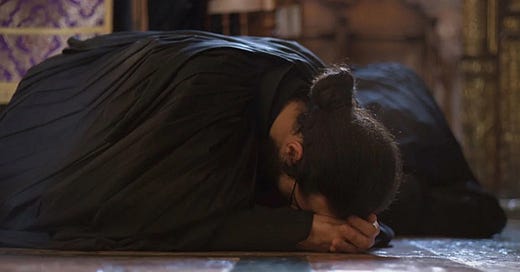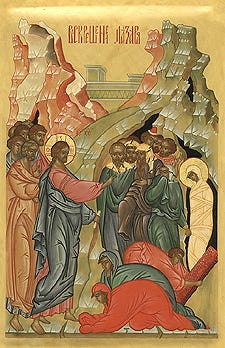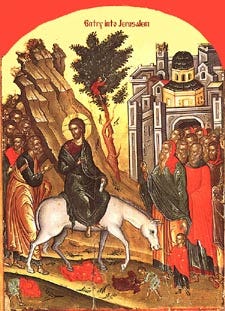“If you renounce your own will, you have defeated the devil and, as a reward, you will receive peace from God. But if you are self-willed, the evil spirit has defeated you, and despondency (weariness, gloom, and dejection) will torment your soul.”
+ St. Silouan the Athonite
Hebrews 12:28-13:8 (Epistle)
28 Therefore, since we are receiving a kingdom which cannot be shaken, let us have grace, by which we may serve God acceptably with reverence and godly fear.
29 For our God is a consuming fire.
1 Let brotherly love continue.
2 Do not forget to entertain strangers, for by so doing some have unwittingly entertained angels.
3 Remember the prisoners as if chained with them – those who are mistreated – since you yourselves are in the body also.
4 Marriage is honorable among all, and the bed undefiled; but fornicators and adulterers God will judge.
5 Let your conduct be without covetousness; be content with such things as you have. For He Himself has said, “I will never leave you nor forsake you.”
6 So we may boldly say: “The LORD is my helper; I will not fear. What can man do to me?”
7 Remember those who rule over you, who have spoken the word of God to you, whose faith follow, considering the outcome of their conduct.
8 Jesus Christ is the same yesterday, today, and forever.
John 11:1-45 (Gospel)
1 Now a certain man was sick, Lazarus of Bethany, the town of Mary and her sister Martha.
2 It was that Mary who anointed the Lord with fragrant oil and wiped His feet with her hair, whose brother Lazarus was sick.
3 Therefore the sisters sent to Him, saying, “Lord, behold, he whom You love is sick.”
4 When Jesus heard that, He said, “This sickness is not unto death, but for the glory of God, that the Son of God may be glorified through it.”
5 Now Jesus loved Martha and her sister and Lazarus.
6 So, when He heard that he was sick, He stayed two more days in the place where He was.
7 Then after this He said to the disciples, “Let us go to Judea again.”
8 The disciples said to Him, “Rabbi, lately the Jews sought to stone You, and are You going there again?”
9 Jesus answered, “Are there not twelve hours in the day? If anyone walks in the day, he does not stumble, because he sees the light of this world.
10 But if one walks in the night, he stumbles, because the light is not in him.”
11 These things He said, and after that He said to them, “Our friend Lazarus sleeps, but I go that I may wake him up.”
12 Then His disciples said, “Lord, if he sleeps he will get well.”
13 However, Jesus spoke of his death, but they thought that He was speaking about taking rest in sleep.
14 Then Jesus said to them plainly, “Lazarus is dead.
15 And I am glad for your sakes that I was not there, that you may believe. Nevertheless let us go to him.”
16 Then Thomas, who is called the Twin, said to his fellow disciples, “Let us also go, that we may die with Him.”
17 So when Jesus came, He found that he had already been in the tomb four days.
18 Now Bethany was near Jerusalem, about two miles away.
19 And many of the Jews had joined the women around Martha and Mary, to comfort them concerning their brother.
20 Then Martha, as soon as she heard that Jesus was coming, went and met Him, but Mary was sitting in the house.
21 Now Martha said to Jesus, “Lord, if You had been here, my brother would not have died.”
22 But even now I know that whatever You ask of God, God will give You.
23 Jesus said to her, “Your brother will rise again.”
24 Martha said to Him, “I know that he will rise again in the resurrection at the last day.”
25 Jesus said to her, “I am the resurrection and the life. He who believes in Me, though he may die, he shall live.
26 And whoever lives and believes in Me shall never die. Do you believe this?”
27 She said to Him, “Yes, Lord, I believe that You are the Christ, the Son of God, who is to come into the world.”
28 And when she had said these things, she went her way and secretly called Mary her sister, saying, “The Teacher has come and is calling for you.”
29 As soon as she heard that, she arose quickly and came to Him.
30 Now Jesus had not yet come into the town, but was in the place where Martha met Him.
31 Then the Jews who were with her in the house, and comforting her, when they saw that Mary rose up quickly and went out, followed her, saying, “She is going to the tomb to weep there.”
32 Then, when Mary came where Jesus was, and saw Him, she fell down at His feet, saying to Him, “Lord, if You had been here, my brother would not have died.”
33 Therefore, when Jesus saw her weeping, and the Jews who came with her weeping, He groaned in the spirit and was troubled.
34 And He said, “Where have you laid him?” They said to Him, “Lord, come and see.”
35 Jesus wept.
36 Then the Jews said, “See how He loved him!”
37 And some of them said, “Could not this Man, who opened the eyes of the blind, also have kept this man from dying?”
38 Then Jesus, again groaning in Himself, came to the tomb. It was a cave, and a stone lay against it.
39 Jesus said, “Take away the stone.” Martha, the sister of him who was dead, said to Him, “Lord, by this time there is a stench, for he has been dead four days.”
40 Jesus said to her, “Did I not say to you that if you would believe you would see the glory of God?”
41 Then they took away the stone from the place where the dead man was lying. And Jesus lifted up His eyes and said, “Father, I thank You that You have heard Me.
42 And I know that You always hear Me, but because of the people who are standing by I said this, that they may believe that You sent Me.”
43 Now when He had said these things, He cried with a loud voice, “Lazarus, come forth!”
44 And he who had died came out bound hand and foot with graveclothes, and his face was wrapped with a cloth. Jesus said to them, “Loose him, and let him go.”
45 Then many of the Jews who had come to Mary, and had seen the things Jesus did, believed in Him.
Lazarus Saturday
The week following the Sunday of Saint Mary of Egypt is called Palm or Branch Week. At the Tuesday services of this week the Church recalls that Jesus’ friend Lazarus has died and that the Lord is going to raise him from the dead (Jn 11). As the days continue toward Saturday, the Church, in its hymns and verses, continues to follow Christ towards Bethany to the tomb of Lazarus. On Friday evening, the eve of the celebration of the Resurrection of Lazarus, the “great and saving forty days” of Great Lent are formally brought to an end:
Having accomplished the forty days for the benefit of our souls, we pray to Thee, O Lover of Man, that we may see the holy week of Thy passion, that in it we may glorify Thy greatness and Thine unspeakable plan of salvation for our sake . . . (Vespers Hymn).
Lazarus Saturday is a paschal celebration. It is the only time in the entire Church Year that the resurrectional service of Sunday is celebrated on another day. At the liturgy of Lazarus Saturday, the Church glorifies Christ as “the Resurrection and the Life” who, by raising Lazarus, has confirmed the universal resurrection of mankind even before His own suffering and death.
By raising Lazarus from the dead before Thy passion, Thou didst confirm the universal resurrection, O Christ God! Like the children with the branches of victory, we cry out to Thee, O Vanquisher of Death: Hosanna in the highest! Blessed is he that comes in the name of the Lord! (Troparion).
Christ —the Joy, the Truth and the Light of All, the Life of the world and its Resurrection—has appeared in his goodness to those on earth. He has become the Image of our Resurrection, granting divine forgiveness to all (Kontakion).
At the Divine Liturgy of Lazarus Saturday the baptismal verse from Galatians: As many as have been baptized into Christ have put on Christ (Gal 3.27) replaces the Thrice-holy Hymn thus indicating the resurrectional character of the celebration, and the fact that Lazarus Saturday was once among the few great baptismal days in the Orthodox Church Year.
Because of the resurrection of Lazarus from the dead, Christ was hailed by the masses as the long-expected Messiah-King of Israel. Thus, in fulfillment of the prophecies of the Old Testament, He entered Jerusalem, the City of the King, riding on the colt of an ass (Zech 9.9; Jn 12.12). The crowds greeted Him with branches in their hands and called out to Him with shouts of praise: Hosanna! Blessed is He who comes in the name of the Lord! The Son of David! The King of Israel! Because of this glorification by the people, the priests and scribes were finally driven “to destroy Him, to put Him to death” (Lk 19.47; Jn 11.53, 12.10).
The feast of Christ’s triumphal Entry into Jerusalem, Palm Sunday, is one of the twelve major feasts of the Church. The services of this Sunday follow directly from those of Lazarus Saturday. The church building continues to be vested in resurrectional splendor, filled with hymns which continually repeat the Hosanna offered to Christ as the Messiah-King who comes in the name of God the Father for the salvation of the world.
The main troparion of Palm Sunday is the same one sung on Lazarus Saturday. It is sung at all of the services, and is used at the Divine Liturgy as the third antiphon which follows the other special psalm verses which are sung as the liturgical antiphons in the place of those normally used. The second troparion of the feast, as well as the kontakion and the other verses and hymns, all continue to glorify Christ’s triumphal manifestation “six days before the Passover” when he will give himself at the Supper and on the Cross for the life of the world.
Today the grace of the Holy Spirit has gathered us together. Let us all take up Thy cross and say: Blessed is he who comes in the name of the Lord. Hosanna in the highest! (First Verse of Vespers).
When we were buried with Thee in baptism, O Christ God, we were made worthy of eternal life by Thy resurrection. Now we praise Thee and sing: Hosanna in the highest! Blessed is he that comes in the name of the Lord! (Second Troparion).
Sitting on Thy throne in heaven, and carried on a foal on earth, O Christ God, accept the praise of angels and the songs of children who sing: BIessed is he who comes to recall Adam! (Kontakion).
At the vigil of the feast of Palm Sunday the prophecies of the Old Testament about the Messiah-King are read together with the Gospel accounts of the entry of Christ into Jerusalem. At Matins branches are blessed which the people carry throughout the celebration as the sign of their own glorification of Jesus as Saviour and King. These branches are usually palms, or, in the Slavic churches, pussy willows which came to be customary because of their availability and their early blossoming in the springtime.
As the people carry their branches and sing their songs to the Lord on Palm Sunday, they are judged together with the Jerusalem crowd. For it was the very same voices which cried Hosanna to Christ, which, a few days later, cried Crucify Him! Thus in the liturgy of the Church the lives of men continue to be judged as they hail Christ with the “branches of victory” and enter together with Him into the days of His “voluntary passion.”
Armed with Faith: Thy Will Be Done (Lazarus Saturday)
This week’s calendar reminders:
Monday 4/7: Lenten Matins 8:30 a.m.
Tuesday 4/8: no services or events
Wednesday 4/9: Presanctified Liturgy 6:30 pm (potluck meal to follow)
Thursday 4/10: Lenten Matins 8:30 a.m.
Friday 4/11: no matins; Vespers of Lazarus Saturday 7 p.m.
Saturday 4/12: Lazarus Saturday Liturgy 9:15 a.m.; Vigil for Palm Sunday 6 p.m.
Sunday 4/13: Palm Sunday - Divine Liturgy 9:15am
CLICK BELOW to donate online:
Christ the Savior Orthodox Church is located in Southbury, Connecticut, and is part of the New England Diocese of the Orthodox Church of America.
Mailing address: Christ the Savior Church, 1070 Roxbury Road, Southbury, CT 06488
PLEASE DONATE to help our parish do the work of the Lord, thrive and grow, and extend the Kingdom of God. May the Lord bless your generosity!
Fr. Moses Locke can be reached at frmoseslocke@gmail.com











